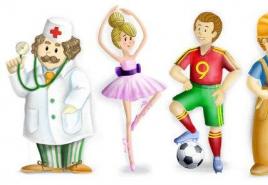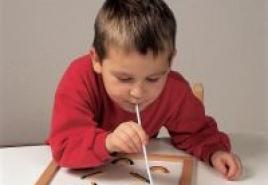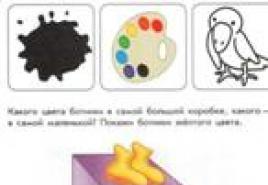What are antonyms and synonyms? Examples: synonyms and antonyms. Antonyms - what are they? Antonyms rules in Russian
" is of Greek origin and is translated as "countername".
Antonyms are words with opposite meanings that express it using paradigmatic connections.
Antonyms are a very interesting phenomenon of language, because... in the human mind are stored in the form of an antonymous pair.
Despite the fact that antonyms are opposed to each other with all their content, their semantic structure is highly homogeneous. As a rule, antonyms differ in one differential feature.
For example, a pair of antonyms “-” has common semantic features (quality, mood) and only one differential one (positive and negative mood).
Due to the homogeneity of the semantic structure, antonyms have almost completely identical combinability.
Types of antonyms
There are 2 types of antonyms:
1) multi-rooted and single-rooted.
Single-root antonyms usually form unprefixed and prefixed words. Examples: friend - foe; bad - not bad; enter - exit; approach - move away.
Antonyms with different roots are completely different in their appearance. Examples: stale - fresh; life death.
2) gradual, non-gradual and vector antonyms.
Gradual antonyms express opposition, which presupposes the existence of intermediate stages between two extreme points. Examples: brilliant - talented - gifted - average abilities - mediocre - mediocre; - capable - intelligent - intelligent - average abilities - stupid - limited - stupid - stupid.
Non-gradual antonyms name concepts between which there is not and cannot be an intermediate degree. Examples: true - false; alive - dead; free - busy; married - single.
Vector antonyms denote the opposite direction of actions, signs, qualities and properties. Examples: forget - remember; increase - decrease; supporter - opponent.
(from the Greek anti - against, ónyma - name) - these are words with the opposite meaning when used in pairs. Those words enter into antonymic relationships which reveal from opposite sides correlated concepts associated with one circle of objects and phenomena. Words form antonymous pairs based on their lexical meaning. The same word, if it is polysemantic, can have several antonyms.
occur within all parts of speech, but the words of the antonymous pair must belong to the same part of speech.
The following do not enter into antonymic relationships:
– nouns with a specific meaning (house, book, school), proper names;
– numerals, most pronouns;
– words denoting gender (man and woman, son and daughter);
– words with different stylistic connotations;
- words with increasing or diminutive accents (hand - hands, house - house).
In their structure, antonyms are not homogeneous. Among them are:
– single-root antonyms: happiness - misfortune, open - close;
– antonyms with different roots: black - white, good - bad.
The phenomenon of antonymy is closely related to the polysemy of a word. Each meaning of a word can have its own antonyms. Yes, word fresh will have different antonymic pairs in different meanings: fresh wind - sultry wind, fresh bread - stale bread, fresh shirt - dirty shirt.
Antonymic relationships can also arise between different meanings of the same word. For example, to review means “to get acquainted with something, check, quickly examining, looking through, reading” and “to skip, not to notice, to miss.” The combination of opposite meanings in one word is called enantiosemy.
Depending on the distinctive features that words with opposite meanings have, two types of antonyms can be distinguished general language(or simply linguistic) And contextual speech(copyright or individual).
General language antonyms are regularly reproduced in speech and enshrined in the vocabulary (day - night, poor - rich).
Contextual speech antonyms- these are words that enter into antonymic relationships only in a certain context: Sing better with a goldfinch than with a nightingale.
The use of antonyms makes speech more vivid and expressive. Antonyms are used in colloquial and artistic speech, in many proverbs and sayings, in the titles of many literary works.
 One of the stylistic figures is built on the sharp opposition of antonym words - antithesis(contrast) – characterization by comparing two opposing phenomena or signs: Long live the sun, may the darkness hide! (A.S. Pushkin). Writers often construct titles of works using this technique: “War and Peace” (L.N. Tolstoy), “Fathers and Sons” (I.S. Turgenev), “Fat and Thin” (A.P. Chekhov), etc. .
One of the stylistic figures is built on the sharp opposition of antonym words - antithesis(contrast) – characterization by comparing two opposing phenomena or signs: Long live the sun, may the darkness hide! (A.S. Pushkin). Writers often construct titles of works using this technique: “War and Peace” (L.N. Tolstoy), “Fathers and Sons” (I.S. Turgenev), “Fat and Thin” (A.P. Chekhov), etc. .
Another stylistic device that is based on a comparison of antonymic meanings is oxymoron, or oxymoron(Gr. oxymoron - lit. witty-stupid) - a figure of speech that combines logically incompatible concepts: a living corpse, dead souls, ringing silence.
Antonym dictionaries will help you find an antonym for a word.Antonym dictionaries– linguistic reference dictionaries, which provide descriptions of antonyms. For example, in dictionary L.A. Vvedenskaya An interpretation of more than 1000 antonymic pairs is given (their synonymous correspondences are also taken into account), and contexts of use are given. A in the dictionary N.P. Kolesnikova Antonyms and paronyms are recorded. The book contains approximately 3,000 paronyms and more than 1,300 pairs of antonyms. There are no illustrations of the use of antonyms in the dictionary.
In addition to general antonym dictionaries, there are also private dictionaries that record polar relations in some narrow areas of vocabulary. This includes, for example, dictionaries of antonyms-phraseological units, dictionaries of antonyms-dialecticisms, etc.
Let us once again pay attention to the most common examples of antonyms: good evil; good bad; friend - enemy; day Night; heat - cold; peace - war, quarrel; true False; success - failure; benefit - harm; rich - poor; difficult - easy; generous - stingy; thick – thin; hard – soft; brave - cowardly; White black; fast – slow; high Low; bitter - sweet; hot Cold; wet – dry; full - hungry; new - old; big small; laugh - cry; speak - remain silent; love - hate.
Still have questions? Can't find an antonym for a word?
To get help from a tutor, register.
The first lesson is free!
website, when copying material in full or in part, a link to the source is required.
Antonyms (gr. anti- against + onyma- name) are words that differ in sound and have directly opposite meanings: truth - lie, good - evil, speak - remain silent. Antonyms usually refer to one part of speech and form pairs.
Modern lexicology considers synonymy and antonymy as extreme, limiting cases of, on the one hand, interchangeability, and on the other, opposition of words in content. At the same time, synonymous relations are characterized by semantic similarity, while antonymic relations are characterized by semantic difference.
Antonymy in language is presented as narrower than synonymy: only words that are correlative on some basis - qualitative, quantitative, temporal, spatial and belonging to the same category of objective reality as mutually exclusive concepts - enter into antonymic relations: beautiful - ugly, much - little, morning - evening, remove - bring closer. Words with other meanings usually do not have antonyms; compare: house, thinking, write, twenty, Kyiv, Caucasus. Most antonyms characterize qualities ( good - bad, smart - stupid, native - alien, dense - rare and under.); There are also many that indicate spatial and temporal relationships ( large - small, spacious - cramped, high - low, wide - narrow; early - late, day - night); fewer antonymous pairs with quantitative meaning ( many - few; single - numerous). There are opposite names for actions, states ( cry - laugh, rejoice - grieve), but there are few of them.
The development of antonymic relations in vocabulary reflects our perception of reality in all its contradictory complexity and interdependence. Therefore, contrasting words, as well as the concepts they denote, are not only opposed to each other, but are also closely related to each other. Word Kind, for example, evokes in our minds the word angry, distant reminds of close, speed up- O slow down.
Antonyms “are at the extreme points of the lexical paradigm,” but between them in the language there may be words that reflect the specified feature to varying degrees, i.e., its decrease or increase. For example: rich- wealthy - poor - poor - beggar; harmful- harmless - useless - useful . This opposition suggests a possible degree of strengthening of a characteristic, quality, action, or gradation (lat. gradatio- gradual increase). Semantic gradation (graduality), therefore, is characteristic only of those antonyms whose semantic structure contains an indication of the degree of quality: young - old, big - small, small - large and under. Other antonymic pairs are devoid of the sign of gradualism: up - down, day - night, life - death, man - woman.
Antonyms that have the attribute of gradualism can be interchanged in speech to give the statement a polite form; so, it's better to say thin, how skinny; elderly, how old. Words used to eliminate the harshness or rudeness of a phrase are called euphemisms (gr. eu- good + phemi- I say). On this basis, they sometimes talk about antonyms-euphemisms, which express the meaning of the opposite in a softened form.
In the lexical system of the language one can also distinguish antonyms-conversives (lat. conversio- change). These are words that express the relation of opposition in the original (direct) and modified (reverse) statement: Alexander gave book to Dmitry. - Dmitry took book from Alexander; Professor accepts test from the trainee.- Trainee rents out test for professor.
There is also intra-word antonymy in the language - antonymy of the meanings of polysemantic words, or enantiosemy (gr. enantios- opposite + sema - sign). This phenomenon is observed in polysemous words that develop mutually exclusive meanings. For example, verb move away can mean “come back to normal, feel better,” but it can also mean “die, say goodbye to life.” Enantiosemy becomes the reason for the ambiguity of such statements, for example: Editor looked through these lines; I listened to divertissement; Speaker misspoke and under.
According to their structure, antonyms are divided into multi-root (day - night) and single-root ( come - go, revolution - counter-revolution). The former constitute a group of actual lexical antonyms, the latter - lexico-grammatical. In single-root antonyms, the opposite meaning is caused by various prefixes, which are also capable of entering into antonymic relationships; compare: V lay down - You lay down at put - from put, behind cover - from cover. Consequently, the opposition of such words is due to word formation. However, it should be borne in mind that adding prefixes to qualitative adjectives and adverbs not without- most often gives them the meaning of only a weakened opposite ( young - middle-aged), so that the contrast of their meaning in comparison with prefix-free antonyms turns out to be “muted” ( middle-aged- this does not mean “old”). Therefore, not all prefix formations can be classified as antonyms in the strict sense of the term, but only those that are extreme members of the antonymic paradigm: successful - unsuccessful, strong - powerless.
Antonyms, as already mentioned, usually form a pairwise correlation in a language. However, this does not mean that a particular word can have one antonym. Antonymic relations make it possible to express the opposition of concepts in an “unclosed” polynomial series, cf.: concrete - abstract, abstract; cheerful - sad, sorrowful, dull, boring.
In addition, each member of an antonymic pair or antonymic series can have its own synonyms that do not intersect in antonymy. Then a certain system is formed in which synonymous units are located vertically, and antonymous units are located horizontally. For example:
smart - stupid sad - rejoice reasonable - stupid sad - have fun wise - brainless yearn - rejoice big-headed - headless smart - stupidSuch a correlation of synonymous and antonymic relations reflects the systemic connections of words in the lexicon. Systematicity is also indicated by the relationship between polysemy and antonymy of lexical units.
EXAMPLES OF SYNONYMS and ANTONYMS?
- synonyms - red, scarlet. Antonyms - black, white.
- synonyms: friend - comrade bright-light
antonyms: thick-thin wide-narrow long-short - Synonyms are words that are similar in meaning but different in spelling.
Example: Big-huge, rush-evil-evil-fly, food-food, throw-throw-throw, run-rush.
Antonyms are words that are opposite in meaning and spelling.
Example: Black-white, big-small, strong-weak, hot-cold, wide-narrow - Synonym: Les Bor
Antonyms: Letter-Number -
- Synonyms: big, huge, big man, horse. Antonyms - true-false, good-evil, good-bad.
- Synonyms are words that differ in sound and spelling, but have the same or very similar lexical meaning, for example: cavalry cavalry, brave brave. Synonyms serve to increase the expressiveness of speech; their use allows you to avoid monotony of speech. It is necessary to distinguish between synonyms and nominal definitions; the latter represent complete identity.
Antonyms are words that are opposite in their lexical meaning, for example: friend, enemy, hot, cold.
Antonyms can be of different types:
Contradictory correlates are antonyms that differ only in the seme of negation. Contradictorial correlates are in relation to privative opposition. For example: bad is good, false is true.
Contrary correlates are antonyms reflecting gradual qualities. There are no clear boundaries between them, that is, everything cannot be reduced to negation. Contrary correlates are in relation to gradual opposition. For example: black white, old young, big small.
Conversions. The same situation is viewed from different points of view. For example: buy sell, husband wife, teach study. - Antonym BEAUTIFUL-SCARY, synonym-smart-wise
- synonyms for the word beautiful - cute, cute.
The antonym for the word beautiful is ugly. - (synonyms are words that are close in meaning) (antonyms are words that are opposite in meaning)
- Synonyms Blizzard, Blizzard, Buran
Antonyms Black, White.))) - Sino#769;nyms are words that differ in sound and spelling, but have the same or very similar lexical meaning, for example: cavalry, cavalry, brave, brave. Synonyms serve to increase the expressiveness of speech; their use allows you to avoid monotony of speech. It is necessary to distinguish between synonyms and nominal definitions; the latter represent complete identity.
Each synonym has its own special shade of meaning, distinguishing it from other synonyms, for example: red scarlet crimson crimson
Antonyms are words that are opposite in their lexical meaning, for example: friend, enemy, hot, cold.
Antonyms can be of different types:
Contradictory correlates are antonyms that differ only in the seme of negation. Contradictorial correlates are in relation to privative opposition. For example: bad is good, false is true.
Contrary correlates are antonyms reflecting gradual qualities. There are no clear boundaries between them, that is, everything cannot be reduced to negation. Contrary correlates are in relation to gradual opposition. For example: black white, old young, big small.
Conversions. The same situation is viewed from different points of view. For example: buy sell, husband wife, teach study. - go to the store go to the store
- Synonyms are words with similar meaning (big, huge).
Antonyms are the opposite of synonyms (big, small). - antonyms: handsome - scary, friendly - hostile, gloomy - cheerful
synonyms: beautiful - cute, cheerful - cheerful, scary - terrible - synonym wind storm
- synonyms similar in meaning antonyms with opposite meanings
- synonym - words with the same meaning, but different spellings - hanger and hanger
antonym - opposite in meaning - hot and cold - thanks#160;
- synonyms - big - huge
antonyms - low - high
This article will be devoted to such an interesting topic as antonyms. What are they and how are they used.
The essence of antonyms
Antonyms are words that differ not only in spelling. Antonyms are words that have opposite meanings. So, for example, the antonym of the word “good” is the word “evil,” and the antonym of the word “friendship” is “enmity.”
Let's take a deeper look at this issue. Let's take two synonyms (words that are similar in meaning). For example, “beauty” and “charm”. The antonym of the word “beauty” is the word “ugliness”. Does this mean that if the word “ugliness” is an antonym for the word “beauty”, then it will be an antonym for the word “charm”. Yes, it does. Thus, we can draw a general conclusion: the antonym of a certain word will also be an antonym for the synonym of this word.
Using antonyms
Many foreign and Russian writers, poets and publicists used antonyms to show the contrast between two situations, between some two states. When two opposite words are used in the same sentence to show some radical difference, it is taken much more seriously and makes us think about what the author is trying to say. For example, this method of storytelling is often found when the author wants to convey to the reader his state of mind.
Lermontov wrote: “In her eyes there is light as in the sky, in her soul it is dark as in the sea.” By using two antonyms in such a beautiful form, the poet showed us the essence of things. Instead of writing several couplets, revealing the theme of the personality of the heroine to whom this line is dedicated, Lermontov made do with just one sentence.
From the above example it is clear that antonyms allow the author not only to shorten his narrative, but also to express his thoughts in a very poetic and original form. This gives him the opportunity to emphasize the uniqueness of his work.


Now you know that antonyms are not only a lexical definition, but also a special technique in creativity. This technique is called antonymy. If you have no attitude towards creativity, this does not mean that you cannot use this technique in your speech. There is a completely different attitude towards a person who knows how to eloquently express his thoughts.







